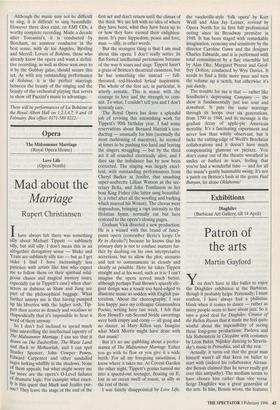Opera
The Midsummer Marriage (Royal Opera House)
Love Life (Opera North)
Mad about the Marriage
Rupert Christiansen
Ihave always felt there was something silly about Michael Tippett — sublimely silly, but still silly. I don't mean this in an altogether derogatory sense — Blake and Yeats are sublimely silly too — but as I get older I find I have increasingly less patience with artists like him who expect me to follow them on their spiritual wild- goose chases and magical mystery tours, especially (as in Tippett's case) when char- acters as dubious as Shaw and Jung are part of the philosophical baggage. What further annoys me is that having pumped UP his librettos with the higher tosh, Tip- pett then scores so densely and vocalises so rhapsodically that it's impossible to hear a word of them anyway.
So I don't feel inclined to spend much time unravelling the intellectual tapestry of The Midsummer Marriage. I can see that it draws on Die ZauberflOte, The Waste Land and Back to Methuselah, and I can spot Stanley Spencer, John Cowper Powys, Edward Carpenter and other sandalled sages lurking whiffily in the shadows. None of them appeals, but what might worry me far more are the opera's 0-Level failures of dramatic logic. For example: what exact- ly is this quest that Mark and Jenifer pur- sue? They leave the stage at the end of the first act and don't return until the climax of the third. We are left with no idea of where they have been, what they have been up to or how they have earned their enlighten- ment. It's pure hippiedom, peace and love, man — silly, in other words.
But the strangest thing is that I am mad about this opera. I don't really notice its flat-footed intellectual pretensions because of the way it soars and sings. Tippett hasn't a grain of Britten's theatrical canniness, but he has something else instead — full- throated, red-blooded lyrical inspiration. The whole of the first act, in particular, is utterly ecstatic. This is music with the courage to love and the strength to com- mit. To what, I couldn't tell you and I don't honestly care.
The Royal Opera has done a splendid job of reviving this astonishing work for Tippett's 90th birthday year. I had some reservations about Bernard Haitink's con- ducting — unusually for him (normally the most cushioning of maestros), he seemed at times to be pushing too hard and leaving the singers struggling — but by the third act it all sounded electrically alive, and I dare say the imbalance has by now been corrected. The singing was largely excel- lent, with outstanding performances from Cheryl Barker as Jenifer, that smashing super-soubrette Lillian Watson as the sec- retary Bella, and John Tomlinson as her boss King Fisher (the latter sang beautiful- ly, a relief after all the woofing and barking which marred his Wotan). The chorus were stupendous, bringing a rapt intensity to the Holstian hymn, normally cut but here restored to the opera's closing pages.
Graham Vick directed a new production. He is a wizard with this brand of fancy- pants opera (remember Berio's loopy Un Re in Ascolto?) because he knows that his primary duty is not to confuse matters fur- ther by daubing on his own interpretative accretions, but to allow the plot, scenario and text to communicate as cleanly and clearly as possible. Here he takes Tippett straight and at his word, such as it is: I can't imagine the opera served much better, although perhaps Paul Brown's sparely ele- gant design was a touch too hard-edged to illustrate music so sodden with English pas- toralism. About the choreography, I was less happy: pace my colleague Giannandrea Poesio, writing here last week, I felt that Ron Howell's sub-Second Stride cavortings were both empty and corny — all gong and no dinner, as Mary Killen says. Imagine what Mark Morris might have done with that music!
But it's no use quibbling about a perfor- mance of The Midsummer Marriage. Either you go with its flow or you give it a wide berth. For all my foregoing snootiness, I know where it takes me. At Covent Garden the other night, Tippett's genius turned me into a spaced-out teenager, floating on E, lost in an ocean swell of music, as silly as the rest of them.
I was faintly disappointed by Love Life, the vaudeville-style 'folk opera' by Kurt Weill and Alan Jay Lerner, revived by Opera North for its first full professional outing since its Broadway premiere in 1948. It has been staged with remarkable imagination, economy and sensitivity by the director Caroline Gawn and the designer Charles Edwards, and it is performed with total commitment by a fine ensemble led by Alan Oke, Margaret Preece and Geof- frey Dolton, conducted by Wyn Davies. It needs to find a little more pace and turn the volume up a notch, but otherwise it's just dandy.
The trouble for me is that — rather like Sondheim's depressing Company — the show is fundamentally just too sour and downbeat. It puts the same marriage through its hoops over six generations, from 1790 to 1948, and its message is the gradual decay of apple-pie American morality. It's a fascinating experiment and never less than wittily observant, but it lacks the cutting-edge of Weill's Brechtian collaborations and it doesn't have much compensating glamour or pizzazz. You don't come out of the theatre wreathed in smiles or bathed in tears, feeling that you've had a wonderful time — and for all the music's gently hummable swing, it's not a patch on Britten's bash at the genre Paul Bunyan, let alone Oklahoma!


































































 Previous page
Previous page